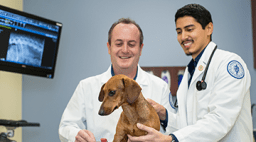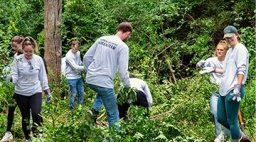Our Commitment
In an effort to expand and intensify Midwestern University's commitment to interprofessional education, the University decided to adopt the principles of the One Health Initiative as a core component of our healthcare philosophy. At its foundation, the One Health Initiative recognizes that the health of humans is connected to the health of animals and the environment. One goal of the initiative is to break down the cultural isolation between the professional health disciplines and ecosystems sciences. The One Health Initiative aims to unite the efforts of physicians, veterinarians, research scientists, and others to gain additional insights into the complex interrelationships between global biodiversity, sustainability, and public health.
At Midwestern University, the plan includes a multiyear effort to introduce, integrate, and measure the impact and improvements developed based on principles outlined in the One Health Initiative. In addition, the University is augmenting its current interprofessional education courses to incorporate the One Health Initiative principles, providing additional support for cross-disciplinary research, and enhancing community service opportunities to provide more comprehensive education and outreach.
Midwestern University expects the One Health Initiative principles and practices to inspire its faculty, staff, and students to work more collaboratively as respected colleagues who understand the nature and interdependency of humans, animals, and the environment and to strengthen the bonds of healthcare professionals through education and research to benefit the health, quality of life, and well-being of all species.
One Health Official Definition
The collaborative effort of multiple health science professions, together with their related disciplines and institutions-working locally, nationally, and globally-to attain optimal health for people, domestic animals, wildlife, plants, and our environment.
The Midwestern University One Health Initiative is designed to engage all faculty, staff, and students in greater understanding that very few medical conditions occur in a vacuum from other individuals, populations, species, and the environment. The health care community is dependent on all professions to work together to provide all-encompassing care to all patients. Therefore, the goal of One Health is to broaden everyone's understanding of opportunities (and responsibilities) to collaborate with other health care providers to optimize their ability to address an individual patient's condition by considering external factors (other health disciplines and environmental factors) impacting health.
One Health is the lens through which we view interprofessional education (IPE) and practice (IPP). This is an essential tool in building a One Health approach.
Our Goals
The goal of One Health is to have graduates of Midwestern University possess the ability to provide comprehensive care when in practice with other health care professionals. Greater awareness of the relationship between individuals, species, and environments in research, teaching, and practice is integral to the teaching of the health care professions and diagnostic and therapeutic processes.
The clear majority of emerging infectious diseases are zoonotic, and many chronic diseases are experienced by animals and people alike. Midwestern University students are exposed to this throughout their basic science and clinical curricula.
Not every topic area our students study nor every health care discipline is equally amenable to a discussion of One Health. However, One Health concepts are incorporated into the curriculum where there is a natural fit.
Throughout graduates' professional career, the One Health education will impact health condition diagnosis, and the treatment recommendations will be more holistic than in the past based on greater awareness of infectious diseases, obesity, physical limitations, mental/behavioral issues, domestic violence, and disaster situations.
One Health in Action
Today's students have a wonderful opportunity to advance the efforts of the One Health Initiative. Your growing knowledge, skills, and abilities are essential as we move forward to achieve optimal health for people, animals, and the environment.
As part of the Interdisciplinary Healthcare course, students break into interprofessional groups to learn about others’ professions as they facilitate review of a One Health case that deals with zoonotic diseases under the guidance of faculty from our various academic programs.
One Health electives have been added to all college curricula. Examples include Veterinary Pharmacology; Introduction to Veterinary Pharmacy; Pharmaceutical and Personal Care Products in the Environment; Development of Newly Approved Drug Therapies; a One Health Grand Rounds course; and a Public Health course.
The Speech-Language Pathology Program on the Downers Grove Campus developed a required One Health course to ensure student understanding of One Health applications to their practice. On the Glendale Campus, the Speech-Language Pathology Program developed an Animal-Assisted Therapy Institute utilizing equine/hippotherapy with faculty and student colleagues in physical and occupational therapy and veterinary medicine programs.
The College of Pharmacy, Downers Grove adapted its longstanding Student Leadership Institute into an interprofessional program including students from the medical, dental, and health sciences programs. Thirty-three students successfully completed the program.
Pet-facilitated therapy is now a component of student learning for osteopathic medicine and occupational therapy students. The Occupational Therapy faculty integrates One Health within didactic education in Pediatric Practice, teaches pet ownership as a valued occupation, and also partners with Horses Help, a therapeutic and recreational agency serving the local special needs population, to offer clinical rotations and volunteer opportunities in equine therapy. In addition, resident therapy dogs Gracie and Maggy have aided Glendale students in stress relief during finals weeks and a similar program on the Downers Grove Campus brings in local therapy dogs to ease student stress and anxiety.
One Health continuing education opportunities benefit alumni and other healthcare professionals. The College of Pharmacy, Downers Grove included One Health aspects at its Diabetes Annual Continuing Education (CE) Program; the Chicago College of Osteopathic Medicine’s One Health Symposium offered CE credit for attending physicians.
One Health Grand Rounds provides an in-depth case study encompassing several healthcare disciplines. The College of Dental Medicine – Illinois developed a tri-annual One Health Grand Rounds open to all colleges. Following a student case study presentation, Midwestern University faculty experts from various healthcare professions present short 10-minute perspectives on topics specific to the patient’s condition. Students hear information from practicing physicians, pharmacists, biomedical scientists and others thereby gaining valuable insight into the benefits of collaborative problem-solving.
The Veterinary Medicine faculty also present weekly One Health Comparative Pathology Grand Rounds for the Glendale Campus, and Daily Gross Pathology Rounds are in development.
The Physical Therapy and Veterinary Medicine programs on the Glendale Campus paired up to provide a new canine rehabilitation program. Animal patients receive physical therapy from Midwestern University faculty at the Companion Animal Clinic following surgery or other treatment.
Midwestern University’s newest clinical building, the Therapy Institute, opened its doors in early 2020. The Therapy Institute houses 5 specialty therapeutic disciplines all operating under one roof. In late 2020, the Therapy Institute launched the Collaborative Care Model (CCM), a specialized interdisciplinary team focused on treating the whole patient, not just a collection of symptoms. The departments of physical therapy, speech and language pathology, occupational therapy, psychology/behavioral health, and vision rehabilitation services all come together to meet the unique needs of patients who are post stroke, brain injury, or other complex conditions requiring multiple specialties.
An interprofessional group of Downers Grove Campus and clinical faculty provided a falls screening event for the community. Falls are the leading cause of fatal and nonfatal injuries among older adults. Midwestern University occupational therapy, clinical psychology, pharmacy, and osteopathic medicine students were also involved in providing a portion of the screenings.
Members of the Maricopa County Sheriff 's Office Search and Rescue division in Arizona and the FBI met with faculty and students from the Arizona College of Podiatric Medicine, the Glendale Campus Department of Anatomy, and the College of Veterinary Medicine for a lab workshop to help them differentiate human bones from animal bones. Bone samples and photos from similar human and animal physiological structures were presented side-by-side for participants to identify, physically handle, and differentiate.
The College of Pharmacy – Glendale, the Arizona College of Osteopathic Medicine, and the College of Veterinary Medicine jointly presented a disaster preparedness lecture series that addressed animals in disaster, mental health in disaster preparedness, and information from the Glendale Emergency Command Center.
The College of Pharmacy, Downers Grove Student Council restructured their sponsored community outreach program to create an interprofessional health outreach program called MWU S.E.R.V.E. (Students Enhancing the Health of Residents in the community Via Education and Screenings). The first MWU S.E.R.V.E. event took place in collaboration with the College of Dental Medicine-Illinois. The committee organized an oral health education event with the SEASPAR EAGLES, a community-based day program for adults with disabilities.
The veterinary medicine faculty and students partnered with Arizona’s largest domestic violence shelter to train the staff and volunteers to recognize pet abuse as a sentinel for domestic violence and to recognize fear of pet abandonment to abusers as a potential cause for remaining in abusive environments. One Health Center faculty participate in monthly teleconferences with state, local, and Federal agencies addressing both human and animal health issues. Midwestern University is the only academic institution represented in this novel collaboration.
College of Veterinary Medicine and Biomedical Sciences faculty and students joined over 80 Midwestern University volunteers in traveling to Guatemala for the annual two-week medical mission affiliated with DOCARE International. While there they treated over 2,000 patients, provided care for their companion and food chain animals, and helped ensure the safety of their water sources.



